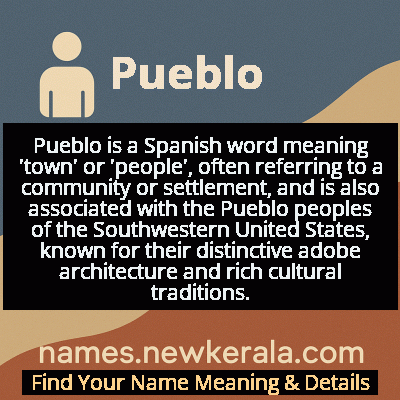Pueblo Name Meaning & Details
Origin, Popularity, Numerology Analysis & Name Meaning of Pueblo
Discover the origin, meaning, and cultural significance of the name PUEBLO. Delve into its historical roots and explore the lasting impact it has had on communities and traditions.
Name
Pueblo
Gender
Male
Origin
Spanish
Lucky Number
8
Meaning of the Name - Pueblo
Pueblo is a Spanish word meaning 'town' or 'people', often referring to a community or settlement, and is also associated with the Pueblo peoples of the Southwestern United States, known for their distinctive adobe architecture and rich cultural traditions.
Pueblo - Complete Numerology Analysis
Your Numerology Number
Based on Pythagorean Numerology System
Ruling Planet
Saturn
Positive Nature
Ambitious, efficient, realistic, and authoritative.
Negative Traits
Materialistic, stressed, confrontational, and can be overly ambitious.
Lucky Colours
Dark blue, black.
Lucky Days
Saturday.
Lucky Stones
Blue sapphire, amethyst.
Harmony Numbers
2, 4, 6.
Best Suited Professions
Business leaders, managers, financial services, law enforcement.
What People Like About You
Leadership, determination, organizational skills.
Famous People Named Pueblo
Pueblo Bonito
Ancient Chacoan Great House
Largest and most famous ancestral Puebloan building in Chaco Canyon, containing over 600 rooms
Pueblo Revolt Leaders
Indigenous Resistance Leaders
Organized and led the successful Pueblo Revolt against Spanish colonization in 1680
Pueblo Architecture
Cultural Architectural Style
Developed distinctive multi-story adobe structures influencing Southwestern architecture for centuries
Name Variations & International Equivalents
Click on blue names to explore their detailed meanings. Gray names with will be available soon.
Cultural & Historical Significance
These communities are renowned for their sophisticated adobe architecture, intricate pottery, textile arts, and complex religious ceremonies that have survived centuries of external pressures. The Pueblo Revolt of 1680 stands as a testament to the resilience associated with this name, when united Pueblo communities successfully expelled Spanish colonists for over a decade. Today, the name evokes images of communal harmony, ancestral wisdom, and cultural endurance against historical challenges, representing both the specific indigenous cultures of the Southwest and broader themes of community resilience worldwide.
Extended Personality Analysis
Individuals named Pueblo are often perceived as deeply connected to community values, tradition, and collective well-being. They typically exhibit strong leadership qualities grounded in wisdom and experience rather than authority, reflecting the consensus-based governance systems of traditional Pueblo societies. These individuals tend to be practical, grounded problem-solvers who value stability and long-term planning over quick fixes. Their personality often shows remarkable resilience and adaptability—qualities honed through centuries of cultural survival in challenging environments.
Pueblo-named individuals usually demonstrate exceptional patience and persistence, understanding that meaningful change often requires generational perspective rather than immediate results. They tend to be excellent mediators and community builders, skilled at finding common ground among diverse viewpoints while maintaining core principles. Their strength lies in their ability to balance tradition with innovation, honoring ancestral knowledge while adapting to contemporary challenges. This combination of deep-rooted values and practical adaptability makes them natural leaders in community-oriented endeavors, often serving as cultural bridges between different generations or social groups.
Modern Usage & Popularity
In contemporary usage, Pueblo remains primarily a place name rather than a common personal name, though it has seen occasional use as a masculine given name particularly in Southwestern United States communities with strong Hispanic or Native American heritage. The name maintains strong geographical associations, most notably with Pueblo, Colorado—a city of approximately 110,000 people that serves as an economic and cultural hub for southern Colorado. As a personal name, it's considered distinctive and meaningful rather than trendy, often chosen by parents seeking to honor Southwestern heritage, communal values, or indigenous roots. The name appears occasionally in business names, artistic projects, and cultural organizations that wish to evoke themes of community, tradition, and Southwestern identity. While not ranking in popular baby name lists, its usage reflects a growing interest in names with cultural depth and historical significance rather than mere popularity, appealing to those who value meaningful connections to place and heritage.
Symbolic & Spiritual Meanings
Symbolically, Pueblo represents community, resilience, and cultural continuity. The name evokes images of interconnected dwellings built to withstand harsh environments, symbolizing how collective strength enables survival and prosperity. It carries connotations of ancestral wisdom passed through generations, representing the importance of maintaining cultural traditions while adapting to changing circumstances. The layered, terraced architecture of pueblo buildings symbolizes social hierarchy and community organization, where each level supports and depends on others. The name also embodies the concept of 'place' as identity—the deep connection between people and their homeland that defines cultural character. In a broader metaphorical sense, Pueblo represents the idea that true strength comes from unity and mutual support rather than individual achievement. The name's symbolism extends to environmental harmony, reflecting the sustainable building practices and resource management that allowed Pueblo communities to thrive in arid landscapes for centuries, making it a powerful emblem of ecological wisdom and community resilience.

